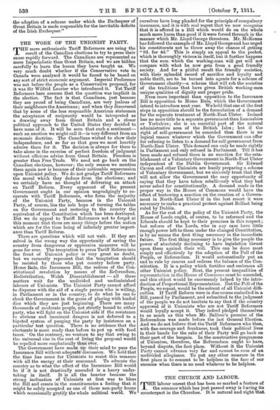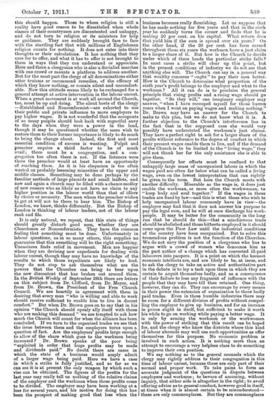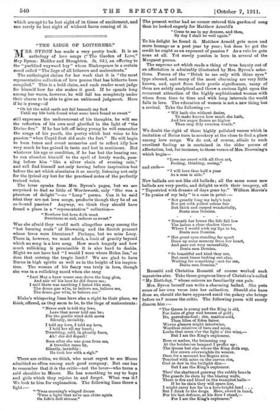THE CHURCH AND LABOUR.
THE labour unrest that has been so marked a feature of the summer which has just passed away is laving its counterpart in the Churches. It is natural and right that. this should -happen. Those to whom religion is still a reality have good reason to be dissatisfied when whole classes of their countrymen are discontented and unhappy, and do not turn to religion or its ministers for help or guidance. They are suddenly brought face to face with the startling fact that with millions of Englishmen religion counts for nothing. It does not enter into their thoughts or their calculations. It has nothing that they care for to offer, and what it has to offer is not brought to them in ways that they can understand or appreciate. Here and there a clergyman who is also a Socialist marches with one crowd or mounts a platform to address another. But for the most part the clergy of all denominations either utter truisms or recommend remedies, of the efficacy of which they know nothing, or remain silent and uncomfort- able. Now this attitude seems likely to be exchanged for a general attempt at active intervention in the labour unrest. When a great movement is at work all around the Church, too, must be up and doing. The silent hosts of the clergy —Established and Nonconformist—are exhorted to use their public and private influence to move employers to pay higher wages. It is not wonderful that the occupants of so many pulpits should look back with regretful envy to the days when they were a power in the land, though it may be questioned whether the mere wish to restore them to their former importance is likely to do much to bring the change about. Indeed, the first and most essential condition of success is wanting. Pulpit and preacher require a third factor to be of much avail ; there must be a congregation, and a con- gregation too often there is not. If the listeners were there the preacher would at least have an opportunity of reaching them. As it is his eloquence is too often wasted on probably lessening minorities of the upper and middle classes. Something may be done perhaps by the familiar methods of large placards and small leaflets, and now and again a church may be filled with a chance medley of new corners who as likely as not have no claim to any higher position in the labour world than that of idlers by choice or necessity. The men whom the preacher wishes to get at will not be there to hear him. The Bishop of London, we lmow, thinks differently. But the Bishop of London is thinking of labour leaders, not of the labour rank and file.
It is only natural, we repeat, that this state of things should greatly disturb good men, whether they are Churchmen or Nonconformists. They have the common feeling that something must be done. Unfortunately in labour questions, as in so many others, this supplies no guarantee that this something will be the right something. Uneasiness finds relief in movement. Men are happier when they are devising new expedients for dealing with labour unrest, though they may have no knowledge of the results to which those expedients are likely to lead. They do not stop to ask themselves what are the powers that the Churches can bring to bear upon the new discontent that has broken out around them. In the British. Weekly of September 28th there are letters on this subject from Dr. Clifford, from Dr. Meyer, and from Dr. Brown, the President of the Free Church Council. We are heartily in agreement with them in desiring that every man "who is willing and able to work should receive sufficient to enable him to live in decent comfort." But when Dr. Brown goes on to say that in his opinion " the Church should openly ally itself with those who are making this demand " we are tempted to ask how much the Church will count for when the alliance has been concluded. If we turn to the organized trades we see that the issue between them and the employers turns upon a question of fact. Are the employers' profits large enough to allow of the share which goes to the workmen being increased ? Dr. Brown speaks of the poor beine. "exploited in order that huge profits may be made and dividends paid." No doubt there are cases in which the state of a business would amply admit of a larger wage being paid. Here we have a case in which a strike is fully justified, and so far as we can see it is at present the only weapon by which such a rise can be obtained. The figures of the profits for the last year may really tell us nothing of the relative claims of the employer and the workman when these profits come to be divided. The employer may have been working at a. loss for several years, and his motive for doing this has been the prospect of making good that loss when the business becomes really flourishing. Let us suppose that he has made nothing for five years and that in the sixth year he suddenly turns the corner and finds that he is making 20 per cent. on his capital. What return does that yield him if the sum is spread over six years ? On the other hand, if the 20 per cent. has been earned throughout those six years the workmen have a just claim to a larger share of it. But how is the Church to decide under which of these heads the particular strike falls ? In most cases a strike will clear up this point, but in the present conditions of industry we do not see that anything else will. The Church can say in a. general way that wealthy concerns " ought " to pay their men better. How is the Church to determine what proportion of the sixth year's profit belongs to the employer and what to the workman P All it can do is to proclaim the general principle that rising profits and a rising wage should go together. " So they will," one imaginary employer may answer, " when I have recouped myself for those barren years when I went on paying wages and making nothing." Dr. Brown may have an answer for the Church to make to this plea, but we do not know what it is. A further objection to the Church's interference lies in the fact that in the supposed case she would very possibly have understated the workmen's just claims. They have a perfect right to ask for a larger share of the profits without reference to the degree of comfort in which their present wages enable them to live, and if the demand of the Church is to be limited to the " living wage," they will not thank her for the only assistance she is able to give them.
Consequently her efforts must be confined to that unhappily large mass of unorganized labour in which the wages paid are often far below what can be called a living wage, even on the lowest interpretation that can rightly be given to the term. But here the Church meets with another difficulty. • Miserable as the wage is, it does just enable the workman, or more often the workwoman, to " keep body and soul together." If the wages in these trades are fixed by law—and this is what those who wish to help unorganized labour commonly have in view----the employer may find that it does not answer his purpose to pay the legal sum, and he will at once discharge his work- people. It may be better for the community in the long run that he should do this—that a mischievous trade should be abolished and those hitherto employed in it should come upon the Poor Law until the industrial conditions of the country have been reorganized. But to solve this tremendous problem is not the function of the Churches. We do not envy the position of a clergyman who has to argue with a crowd of women who denounce him as the part author of a change which has converted ill-paid labourers into paupers. It is a point on which the keenest economic intellects are, and are likely to be, at issue, and to ask the clergy to take an active and authoritative part in the debate is to lay a task upon them in which they are certain to acquit themselves badly, and as a consequence of their failure to lose any fragment of influence with the people that they may have till then retained. One thing, however, they can do. They can encourage by every means in their power the extension of organization to these badly paid trades. Even in these humble industries there may be room for a different division of profits without compel- ling the employer to give up business, and for an increase in prices slight in itself, but sufficient to make it worth his while to go on working while paying a. better wage. It is only by arming the workmen or the workwomen with the power of striking that this result can be hoped for, and the clergy who know the districts where this kind of labour abounds may well use such opportunities as offer themselves for this purpose. No economic problem is involved in such action. It is nothing more than an attempt to encourage a very helpless class to do something to improve their own position. We say nothing as to the general counsels which the clergy may rightly address to their congregation in this time of labour unrest, because these are only part of their normal and proper work. To take pains to form an accurate judgment of the questions in dispute between employers and workmen ; to beware of assuming, without inquiry, that either side is altogether in the right; to avoid offering advice as to general conduct, however good in itself, at times when it is almost certain to be misunderstood— these are only commonplaces. But they are commonplaces
which are apt to be lost sight of in times of excitement, and can rarely be lost sight of without harm coming of it.
































































 Previous page
Previous page